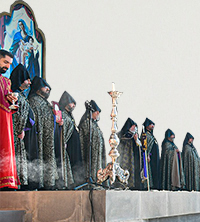
Dramatic events have taken place in Armenia over the past two and a half years. In 2018, there was a change of power, which the new government called a revolution. The new authorities pursued an internal policy of aggression, dividing the society into “blacks” and “whites”, “old” and “new”. Social networks were flooded with mutual accusations and insults. Intolerance sometimes reached its peak. The year 2020 was especially tragic, on the one hand the coronavirus, on the other hand the Artsakh war was the cause of many victims.
In dramatic and tragic times, people strive for faith, seeking salvation from the difficulties that take place in their lives, but even that did not happen in Armenia. Even during the war, people continued to spread hatred, accusations and enmity towards each other on social networks.
In such stifling conditions no one felt the mediating and comforting presence of the church. Before the “revolution”, the Armenian Apostolic Church was declared in the highest circles of the new government as a part of the “old”, the former government, which is a corrupt, “anti-popular” structure and has no place in the “New Armenia” declared by them. As a result, the church stepped aside, not wanting to remind about itself and to be the target of intolerance again.
This is a general description of the situation. However, was that the only possible behavior of the Armenian Church? In such conditions, could not the Church transform itself in such a difficult situation, come up with new words and new slogans and correct its image, conveying to the people the long-awaited comforting words of encouragement, solidarity and mutual tolerance?
Why has it turned out that way? For more than twenty years the church has started working on the development of its social concept, which, however, is still not ready. Church-society, church-state relations are still devoid of concepts. Obviously, the Armenian Church is unable to assess the state of society in Armenia today, its expectations, and, consequently, design its formal church policy.
The Church, being a conservative structure, based on the belief in God, its theology, which comes from the depths of the centuries, nevertheless must render them based on modern law and needs, that is, it must be able to deliver its word in new ways, continue to develop its theological thought.
As we see, it does not work yet; no one can do that hard and responsible work instead of the church, nor does he have the authority to do it.